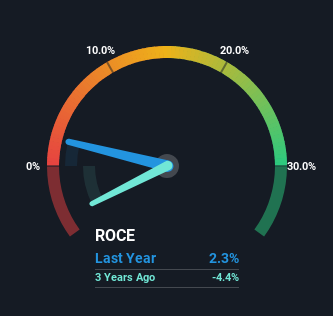Viscom (ETR:V6C) Has Some Difficulty Using Its Capital Effectively
What underlying fundamental trends can indicate that a company might be in decline? Typically, we'll see the trend of both return on capital employed (ROCE) declining and this usually coincides with a decreasing amount of capital employed. Basically the company is earning less on its investments and it is also reducing its total assets. On that note, looking into Viscom (ETR:V6C), we weren't too upbeat about how things were going.
What Is Return On Capital Employed (ROCE)?
For those that aren't sure what ROCE is, it measures the amount of pre-tax profits a company can generate from the capital employed in its business. Analysts use this formula to calculate it for Viscom:
Return on Capital Employed = Earnings Before Interest and Tax (EBIT) ÷ (Total Assets - Current Liabilities)
0.023 = €1.6m ÷ (€107m - €40m) (Based on the trailing twelve months to June 2024).
So, Viscom has an ROCE of 2.3%. Ultimately, that's a low return and it under-performs the Electronic industry average of 11%.
Check out our latest analysis for Viscom

Above you can see how the current ROCE for Viscom compares to its prior returns on capital, but there's only so much you can tell from the past. If you'd like, you can check out the forecasts from the analysts covering Viscom for free.
So How Is Viscom's ROCE Trending?
In terms of Viscom's historical ROCE movements, the trend doesn't inspire confidence. Unfortunately the returns on capital have diminished from the 11% that they were earning five years ago. Meanwhile, capital employed in the business has stayed roughly the flat over the period. Companies that exhibit these attributes tend to not be shrinking, but they can be mature and facing pressure on their margins from competition. If these trends continue, we wouldn't expect Viscom to turn into a multi-bagger.
On a side note, Viscom's current liabilities have increased over the last five years to 37% of total assets, effectively distorting the ROCE to some degree. If current liabilities hadn't increased as much as they did, the ROCE could actually be even lower. While the ratio isn't currently too high, it's worth keeping an eye on this because if it gets particularly high, the business could then face some new elements of risk.
The Bottom Line
All in all, the lower returns from the same amount of capital employed aren't exactly signs of a compounding machine. Investors haven't taken kindly to these developments, since the stock has declined 59% from where it was five years ago. With underlying trends that aren't great in these areas, we'd consider looking elsewhere.
One more thing, we've spotted 1 warning sign facing Viscom that you might find interesting.
For those who like to invest in solid companies, check out this free list of companies with solid balance sheets and high returns on equity.
New: Manage All Your Stock Portfolios in One Place
We've created the ultimate portfolio companion for stock investors, and it's free.
• Connect an unlimited number of Portfolios and see your total in one currency
• Be alerted to new Warning Signs or Risks via email or mobile
• Track the Fair Value of your stocks
Have feedback on this article? Concerned about the content? Get in touch with us directly. Alternatively, email editorial-team (at) simplywallst.com.
This article by Simply Wall St is general in nature. We provide commentary based on historical data and analyst forecasts only using an unbiased methodology and our articles are not intended to be financial advice. It does not constitute a recommendation to buy or sell any stock, and does not take account of your objectives, or your financial situation. We aim to bring you long-term focused analysis driven by fundamental data. Note that our analysis may not factor in the latest price-sensitive company announcements or qualitative material. Simply Wall St has no position in any stocks mentioned.
About XTRA:V6C
Viscom
Develops, manufactures, and sells inspection systems for industrial production applications in Europe, the Americas, and Asia.
Very undervalued with reasonable growth potential.
Similar Companies
Market Insights
Weekly Picks


The Future of Social Sharing Is Private and People Are Ready


EU#3 - From Philips Management Buyout to Europe’s Biggest Company

Booking Holdings: Why Ground-Level Travel Trends Still Favor the Platform Giants


A fully integrated LNG business seems to be ignored by the market.
Recently Updated Narratives
Czechoslovak Group - is it really so hot?


Is Ubisoft the Market’s Biggest Pricing Error? Why Forensic Value Points to €33 Per Share

Hotel101 Global: A Scalable Hospitality Platform Built to Compound
Popular Narratives

Undervalued Key Player in Magnets/Rare Earth


NVDA: Expanding AI Demand Will Drive Major Data Center Investments Through 2026


The "Easy Money" Is Gone: Why Alphabet Is Now a "Show Me" Story
Trending Discussion







